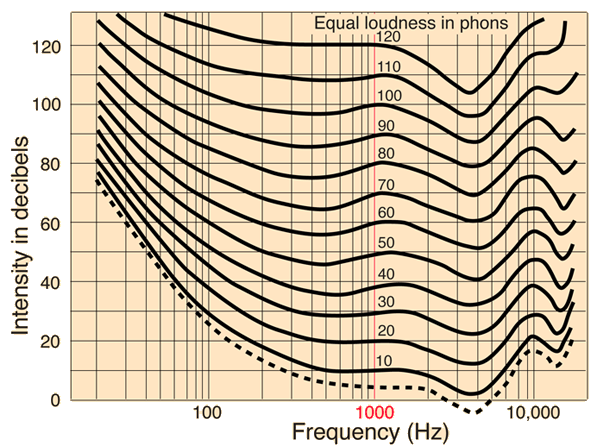I've written about it before, but I never really focused on it....
When we compare any two audio systems, or compare the difference in sound between two components in a system, it is absolutely critical to get the gain levels exactly the same. As I have written, I've participated in and edited research on how a mere 0.1dB change in SPL for the listener can be perceived as being an entirely different system. Between the change in loudness, you also have to take into account the "equal loudness curve" which dictates that any shift in overall loudness will also change your perceived frequency balance as well.
Take a look at the equal loudness curve:

If you are listening to your carefully chosen and endlessly studied auditioning material at an average of 70dB SPL and you replace amp A with amp B which has a difference in gain of 0.5dB, then the change in the loudness of everything below, say, 80Hz may sound like it is louder by 1.0dB SPL while the midrange is only louder by 0.5dB SPL. You will think the new amp has "more control over the bass" or "better impact", while in fact, all you did was increase the listening level by a scientifically measurable amount of 0.5dB SPL.
The same is true for comparing balanced versus unbalanced interfaces - you are not assured that the gain structure of the balanced interfaces is identical to the gain structure of the unbalanced interfaces.
What I've found when comparing anything in the electronics chain is that taking a few minutes to carefully calibrate the output with an AC voltage meter with a 1,000Hz sine wave ensures what you are comparing is apples to apples. It is bit more time consuming, but it makes a HUGE difference in how you will perceive the difference between any two parts of your system. With speakers is isn't as simple as that.
With speakers you have to estimate a similar SPL by measuring the frequency response. You can use a bandwidth limited Pink Noise signal which only includes about 600Hz to 3,000Hz and match the two speakers identically. Or, you can measure the frequency response, compare their SPL response on a response chart and try to adjust one of them until it appears to overlap as much as possible in the 200Hz to 7kHz range. But it isn't as easy because no two speakers has the same frequency response... and at different levels they will react differently in their output.
My advice to all of you is this....
If you want to know if your brand new amp, CD player, tube rolling, or whatever, is really different, get a good AC voltmeter and measure the output voltage at the speaker connector or headphone jack and ensure that both configurations are putting out the exact same voltage from the same source signal.
When we compare any two audio systems, or compare the difference in sound between two components in a system, it is absolutely critical to get the gain levels exactly the same. As I have written, I've participated in and edited research on how a mere 0.1dB change in SPL for the listener can be perceived as being an entirely different system. Between the change in loudness, you also have to take into account the "equal loudness curve" which dictates that any shift in overall loudness will also change your perceived frequency balance as well.
Take a look at the equal loudness curve:

If you are listening to your carefully chosen and endlessly studied auditioning material at an average of 70dB SPL and you replace amp A with amp B which has a difference in gain of 0.5dB, then the change in the loudness of everything below, say, 80Hz may sound like it is louder by 1.0dB SPL while the midrange is only louder by 0.5dB SPL. You will think the new amp has "more control over the bass" or "better impact", while in fact, all you did was increase the listening level by a scientifically measurable amount of 0.5dB SPL.
The same is true for comparing balanced versus unbalanced interfaces - you are not assured that the gain structure of the balanced interfaces is identical to the gain structure of the unbalanced interfaces.
What I've found when comparing anything in the electronics chain is that taking a few minutes to carefully calibrate the output with an AC voltage meter with a 1,000Hz sine wave ensures what you are comparing is apples to apples. It is bit more time consuming, but it makes a HUGE difference in how you will perceive the difference between any two parts of your system. With speakers is isn't as simple as that.
With speakers you have to estimate a similar SPL by measuring the frequency response. You can use a bandwidth limited Pink Noise signal which only includes about 600Hz to 3,000Hz and match the two speakers identically. Or, you can measure the frequency response, compare their SPL response on a response chart and try to adjust one of them until it appears to overlap as much as possible in the 200Hz to 7kHz range. But it isn't as easy because no two speakers has the same frequency response... and at different levels they will react differently in their output.
My advice to all of you is this....
If you want to know if your brand new amp, CD player, tube rolling, or whatever, is really different, get a good AC voltmeter and measure the output voltage at the speaker connector or headphone jack and ensure that both configurations are putting out the exact same voltage from the same source signal.
